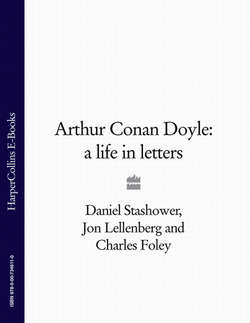Читать книгу Arthur Conan Doyle: A Life in Letters - Daniel Stashower, Исмаил Шихлы - Страница 13
Michael Conan to Mary Doyle PARIS, APRIL 11, 1864
ОглавлениеWith regard to that philosopher, Master Arthur, whose sympathy with the carnivorous tiger is so ultra comical. I shall look to his development with great interest. The question you ask about his schooling can have scarcely yet arisen. Keep him at your apronstrings for two or three years more, at least. You can teach him much of the initiating and more necessary matters. Win him into multiplication, division and the rule of three and make him practically familiar with geography. I would soon familiarize him with maps. His more serious schooling gives rise to a nice question. I perfectly accord with you, in all your expansive geniality of opinion—in all your unexclusive humanity—remembering your friend Burns’ prophetic record—
‘It’s coming yet, for a that that man to man, the world over shall brothers be, for a that.’
and I do not encourage my old acquaintances, the Jesuits, for their devotion to the per-centa creed—but in matters of education—I mean mere secular education, they are, from experience and their employment therein, of the highest order of mind, unmatched. Therefore the question will assume this form—viz, have you any school at Edinburgh where a boy of gentle birth can be thoroughly well instructed on terms as reasonable as those which you would have to disburse in consigning Master Arthur to the Jesuits—and that gives rise to the further query—have you in Edinburgh, as they have in Dublin, a good Jesuit day school? But this question, as I have said, cannot be ripe for decision for two or three years more. In the meantime, keep your attention awake on the subject and be ready for the final move, when made it must perforce be. As to Arthur’s future development, that, apart from Nature’s endowments, will much depend upon the mother who cherishes him and at once secures his love and respect.
Three years later Michael Conan presented his godson, now eight, with a book about French history, feeding a growing interest in pageantry and ancient codes of honour. Already the boy was fascinated with tales of knights and their deeds, and the sweep and glamour of history—‘which,’ he later wrote, ‘I drank in with my mother’s milk.’
Mary Foley at the of her marriage, by Richard Doyle
